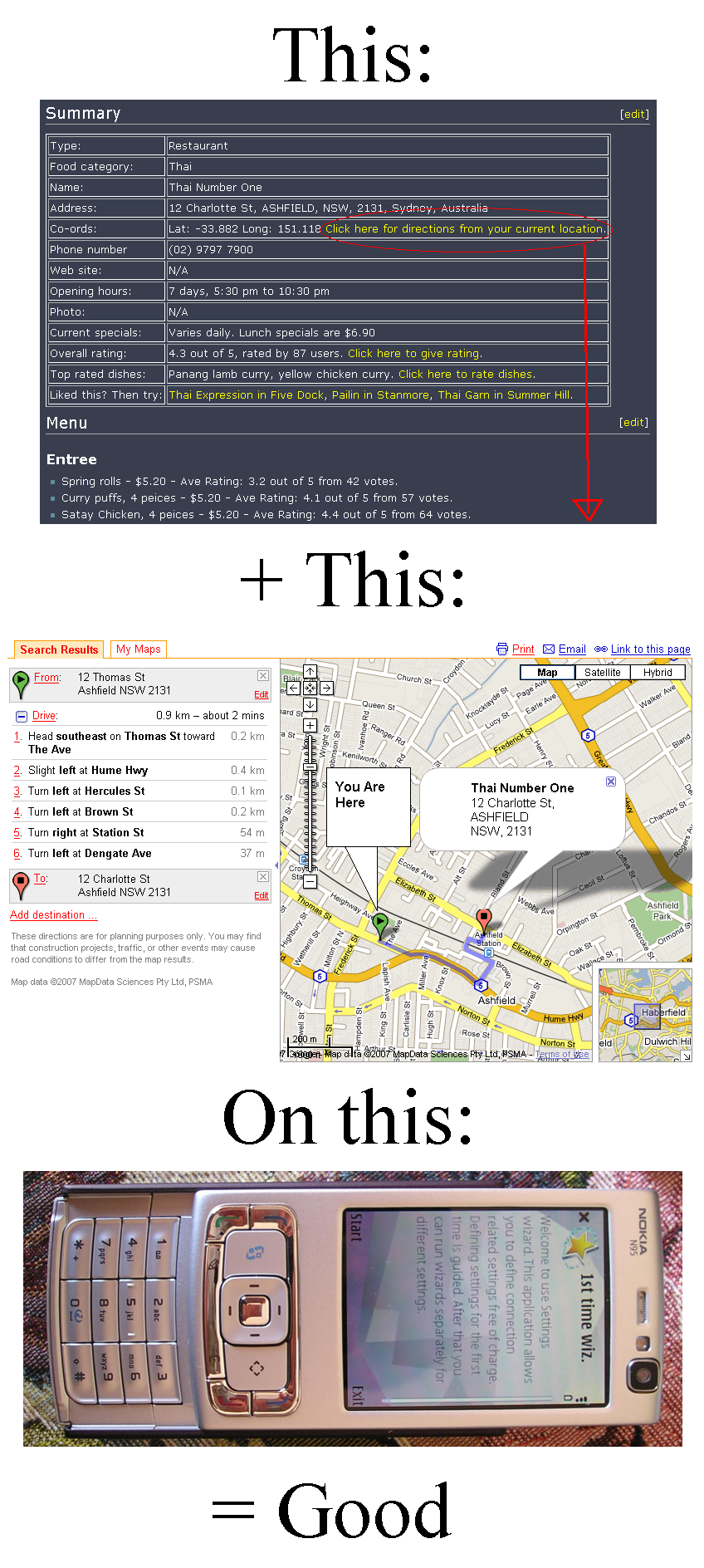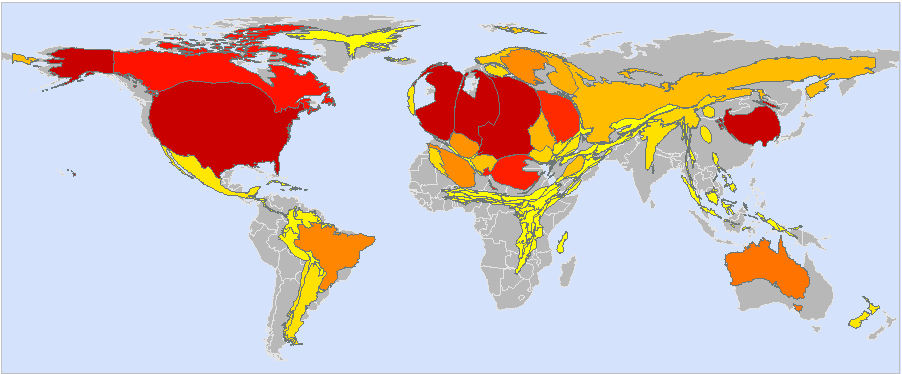There are some important changes coming in the next five years around how people will use wikis, specifically in conjunction with mobile devices. I’d like to publicly outline my thoughts on the background, the premise, and the potential.
Background
First some background. Around 4 or 5 years ago, most laptops started including local wireless and better power-saving as standard (i.e. greater portability of computing power). About 2 years ago, the number of laptops sold exceeded the number of desktop and server systems sold, and that trend has only continued since (i.e. greater ubiquity of portable computing power).
About 12 years ago, the first mobile phone I owned was a second-hand classic Motorola the size and weight of a small brick (it was too heavy to carry often, so mostly I left it in my car – it was similar to this, but a bit smaller – it was mobile, but not wearable, and the battery life was rubbish, maybe a few hours, and it could only do phone calls). About 9 years ago my phone was basic Nokia – it was much lighter, with battery life of a bit over 1 day, but it was still a bit heavy so it had a belt clip, and it could make calls and send SMS (i.e. very basic data). My current Nokia phone is about 4 years old, it’s cheap, it’s lightweight (85 grams), it has battery life of about a week, and it does WAP, but no Wi-Fi. So the trend lines are clear in retrospect for both laptops and mobiles, and looking ahead, they are converging: Greater portability; Greater computing power; Greater battery life; Greater access to mobile data; And mobile phones are basically becoming wearable mini-computers that you carry around in a pocket with you.
The premise
So far, this hasn’t impacted wikis too much, but I think we’re about to reach a tipping point where these trends do have a bigger impact on wikis – I would like outline why, and what’s required for it to happen. In particular, lately a number of friends and family have independently upgraded to mobile phones with inbuilt GPS plus mobile Internet functionality. I think GPS + mobile Internet + wikis could be a game changer, and it could be a seriously kick-arse combination. But you need all 3 components for it to work.
Think about it – a wiki that has local information about your area, the best restaurants, the best sights and entertainment, all with genuine user-comments and guides and feedback and ratings. Everything in that wiki is geotagged – that’s part of the core purpose of the wiki. You “carry” the wiki with you in your pocket, on your phone, through your mobile Internet. And as you move around, the GPS shows you where you are, and what’s near to you that has got articles and that was good. Wander wherever you like, knowing that you’ll always have the best low-down on what’s good and what’s not, no matter where you are. Be a local anywhere.
Now the mobile phone manufacturers have already started to include some limited GPS software with “points of interest” on their phones – e.g. the Nokia Navigator 6110 will show you nearby ATMs, petrol stations, public bathrooms, etc. That’s great for facts for commodity destinations (e.g. most ATMs or Petrol stations are completely interchangeable). But what about restaurants – which ones are worth eating at, and are in your budget? Sights – which ones are actually worth seeing, according to the people that have been there? The currently GPS software lacks depth in this regard, but worse it lacks participation. This makes it broken.
There are audio tour guides starting to show up for cities – e.g. in Hong Kong you can purchase a SIM card which would then give you free over-the-phone access to a canned tour guide you can listen to as you wandered in a certain area of the city. But it’s basically scripted for you, and you don’t get to “edit” it to add your picks for those who come after you. Canned audio guides lack interactivity and participation.
There are some city-specific wikis (e.g. DavisWiki, ArborWiki), which have good depth about an area. But mostly they lack geotagging, and there’s bound to be some server-side software updates needed to make location-aware wikis work well on mobile phones. So currently the wikis we have about a specific location aren’t particularly usable from a mobile phone. They’re about a place, but they are not location-aware or portable. As a result, city-specific wikis have been a niche wiki application, but in a few years the number of wikis in this area will explode. I know that a number of entrepreneurs are interested in local wikis or the data stores behind them, and it’s an area that has a huge and largely untapped potential, but which to date has mostly been done well by transitory college students.
There are some sites (e.g. for New York) where you can get functionality something like what I’m describing (by scribbling notes on a map), but I suspect it’s not as deep or as broad or as structured as a wiki can be.
No, what you need is all 3 things together: The location-awareness of GPS, the depth and timeliness of being able to access a great big store of current information via the Internet, and the participation of wikis. But it will happen. I’m calling it – mark my words. And whoever does it first and does it best will probably make a bloody fortune.

The problems
What’s holding it back currently is that advanced phones are expensive (e.g. about AU $850 for a Nokia N95, but there is at least one open-source phone which will have GPS called the OpenMoko in development), not all phones have GPS (e.g. the lauded iPhone lacks GPS – what were Apple thinking? – wouldn’t buy one of these until it has GPS if I were you), and mobile Internet is expensive and often usage-metered rather than flat rate. But those things will get fixed in time. The technology exists and works – it just needs to become widely distributed. Mobile Internet will become ubiquitous in phones, even the cheap ones. GPS will become ubiquitous in phones, even the cheap ones. And mobile Internet will get cheaper as demand for it increases and competition increases, or it will be overtaken by citywide mesh wireless networks. These things will happen, and the opportunity is very real. So it’s not an “if” but a “when”. I’m thinking maybe 5 years before it’s common to see people in the street doing this. But if you want to be there and be ready for that time in 5 years, you probably need to start building it now. But the building it will probably be expensive, simply because the first one of anything non-trivial in software usually is expensive.
What will it look like? How will it work?
The first thing to realise is that if you’re walking around, you don’t normally want a lot of text. A 40-kilobyte Wikipedia article is a tad unwieldy to read on a 2.6″ screen whilst walking around in the full sunlight. What you want instead is a summary of information, possibly spoken by software instead of written text. A little bit of the right information at the right time: “Turn left here. Walk 50 metres. It’s nearly lunchtime – Excellent Portuguese Chicken on your right for $10”. Keep it simple, keep it short.
Now if people want more information at that point, then give it to them. “Hmm… Portuguese food… yum, sounds tasty… let’s quickly scan the menu and ratings… **click** **scroll** … okay, sold!”
Now it’s not a wiki unless you can then add your thoughts. So after you meal, you notice that the hours are slightly out of date, and correct them. Maybe you upload a photo of the shop or your dish (before you ate it!). And you add a rating (4 out of 5) and a quick note: “the chicken is succulent and tasty. Be sure to ask for garlic sauce on your chips – it tastes great!”
Another thing you could do is follow a planned route if you’re new to an area, for a “best of” tour. This is kind of like the Hong Kong idea, but because it’s a wiki it could evolve and be updated in a decentralised fashion. Similarly planning your own routes for later, and storing them on the wiki, would be good. And after you had done the route, if the wiki asked you whether you had any corrections or updates that you wanted to make, then that would be good.
There will also probably have to be a more traditional detailed way to view the wiki, like the standard Wikipedia Monobook skin. This would allow both mobile and desktop users to update and edit the site, whilst still allowing mobile users to have a more concise view of the information.
An important thing to note is that most of the content has to be created by locals. Someone on the other side of the planet can add skeleton entries for restaurant or parks or museums such as names and addresses, but the valuable content, the user-generated stuff, has to come from ordinary users, on the ground, who know the place in question, have tried it, and have had some sort of reaction. So a low barrier to entry (much lower than the Wikipedia) is required to allow sufficient people to contribute feedback to allow it to work.
How to make it happen faster
The single best way to help make this happen faster is to build citywide free mesh wireless networks in your neighbourhood. The mobile Internet is the biggest stumbling block, and big telecoms are hugely resistant to change or dropping their prices unless forced to (basically, they’re pricks). GPS in phones is coming, and I see no sign that companies like Nokia are holding back; and wiki people generally don’t hold back, so that doesn’t worry me either. The wireless networking does a bit though. The answer may be to build a grassroots network, using a self-healing easy-deployment wireless mesh, such as Meraki is doing in San Francisco. (By the way, if anyone wants to start making one of these mesh networks in Sydney, let me know, I’d happily be involved in that).
Anyway, that’s it from me. Just remember: GPS phone + wireless Internet + local wikis = perfect storm. Ciao!


